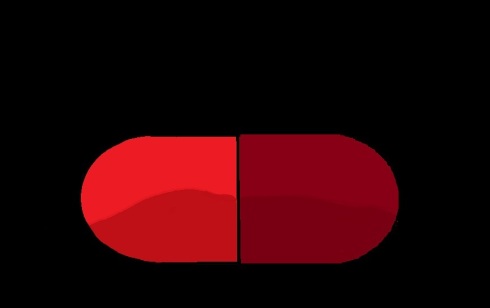
A guy goes to a doctor.
A guy goes to a doctor.
“Doc, I’m in awful pain. Please help me.”
“Okay,” says the doc. “Here’s two pills. Take the blue one in the morning, and the red one at night.”
“I’ll take the blue one,” the guys says, “but not the red one.”
“Why not?”
“I hate red.”
This joke kept floating into my mind last week because of a string of conversations I found myself having.
They were conversations with
~ an alcoholic who drinks due to loneliness but won’t leave his isolation to attend AA,
~ a mom who craves a close relationship with her daughter but won’t stop telling her what to do,
~ a husband who wants his wife to forgive his affair but walks away when she tries to talk about her feelings of hurt and anger, and
~ a wife and mother exhausted from meeting everyone else’s needs, but who won’t say No to any demand made of her.
Each in considerable pain. Each avoiding some obvious step to relieve it.
Each saying I hate red.
Therapists call this help-seeking, help-rejecting behavior, and it reflects a largely unconscious cost/benefit analysis. On some level each of these people has decided that the discomfort of solving their problem would be greater than the discomfort caused by the problem itself. (I hate this pain, but I hate red more.)
Pretty common, this. We all have red pills. They’re what we make New Year’s resolutions about. Things we should do but just can’t stop avoiding.
Exercise more. Watch less tv. Eat less sugar. Ask for that raise. Write that damned book.
There are tons of books and articles about how to handle this. Just this morning I came across two new ones: Leo Barbauta’s “The Do Plan, or why we know but don’t do”. and Jack Canfield’s “The power of determination.”
But what’s it all have to do with control?
Red-pill behavior illustrates what I call the Third Paradox*:
To get control in one place,
you have to give it up in another.
Want control of your weight? Give up control of your food choices. Want control of your loneliness? Give up avoiding people. Want your daughter’s company? Stop controlling her. And so on.
Here’s the key:
In practice, what “give it up in another”usually means is stop avoiding some uncomfortable feeling.
Behind all controlling is the wish to control or manage feelings. Notice those examples above. The alcoholic is managing social anxiety. The mom is managing frustration with her daughter’s life choices. The husband is managing guilt over his affair.
But in backing away from those feelings they’ve backed into new problems. So solving those problems will mean learning to tolerate the feelings they avoid.
Again, we all do this. We always will. We’re all control addicts. It’s how we’re wired. No point in beating yourself up over it.
But:
If you have a problem of which you’re really really really sick and tired, you might reapproach it by noticing that’s it’s really a solution as well — your way of protecting yourself from some particular emotional experience.
This sort of redefinition is the essential first step towards any solution.
So:
What’s the red pill in your life?
.
________________________________
*Click here for descriptions of the First and Second paradoxes.
 .
.













